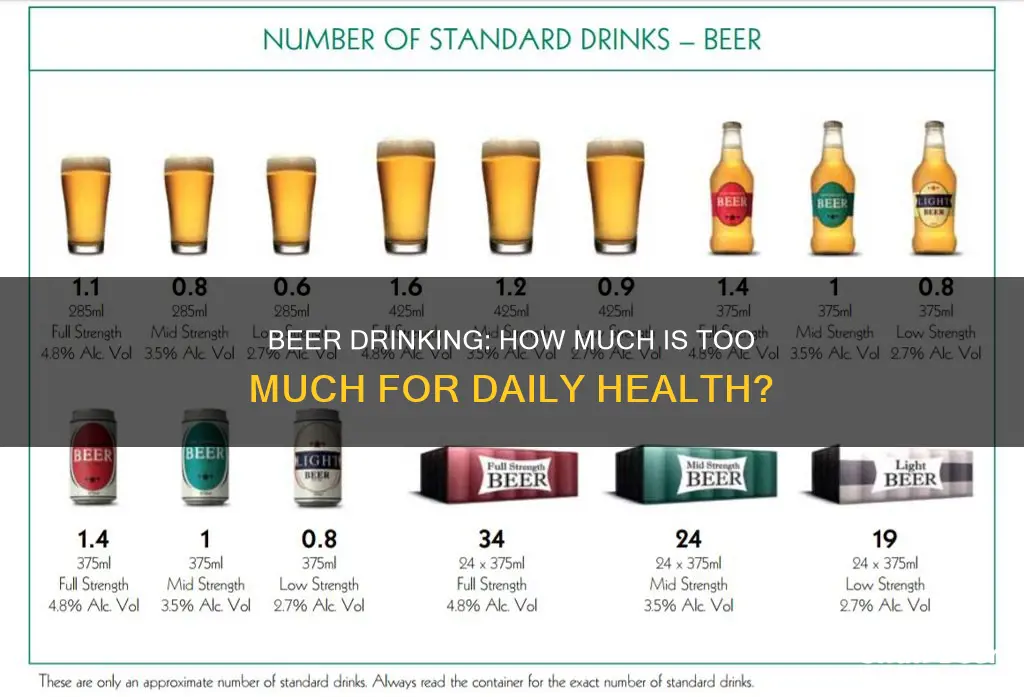
Beer is a popular alcoholic drink that has been consumed for thousands of years. While it is often viewed as having little nutritional value, beer does contain various vitamins and minerals. Light to moderate beer consumption may have positive health effects, such as reducing the risk of heart disease, improving blood sugar control, and increasing bone density. However, excessive consumption can lead to negative health consequences, including an increased risk of cancer, liver disease, cardiovascular disease, and neuropsychiatric diseases. So, how much beer is healthy to drink per day?
According to the Dietary Guidelines for Americans, moderate alcohol consumption is defined as one drink per day for women and two drinks per day for men. One drink is equivalent to 12 ounces of regular beer, 1.5 ounces of liquor, or 5 ounces of wine. It is important to note that these recommendations are for daily consumption and cannot be batched over several days. Binge drinking, which is considered more than four or five drinks for women and men, respectively, within two hours, is associated with increased health risks. Therefore, to maintain a healthy relationship with beer, it is crucial to consume it in moderation and ensure that it does not interfere with a balanced diet and regular exercise.
| Characteristics | Values |
|---|---|
| Number of standard drinks per day for women | 1 |
| Number of standard drinks per day for men | 1-2 |
| Number of standard drinks per week for women | 7 |
| Number of standard drinks per week for men | 14 |
| Number of grams of alcohol per day for women | 10-16 |
| Number of grams of alcohol per day for men | 20-28 |
| Number of grams of alcohol per week for women | 75-196 |
| Number of grams of alcohol per week for men | 112-252 |
What You'll Learn

Beer's health benefits
Beer has been consumed for thousands of years, and it is no wonder that some claim it has health benefits. While beer can have drawbacks, science supports some of these claims.
Heart Health
Numerous studies have shown that drinking one to two beers a day may help lower the risk of heart disease. Beer contains polyphenols, which are antioxidants that protect the heart's cells from damage. Beer also helps to increase HDL, or "good" cholesterol, which removes harmful LDL cholesterol from the bloodstream. Additionally, beer is a source of vitamin B6, which can prevent the buildup of homocysteine, an amino acid linked to heart disease.
Improved Blood Sugar Levels
Drinking light amounts of alcohol may help reduce the risk of developing diabetes and help people with diabetes control their blood sugar more effectively. One study showed that one to two drinks a day could lower the risk of developing diabetes by as much as 50%. This effect is most pronounced with low-sugar beers, so the type of beer consumed is important.
Bone Strength
Early research suggests that moderate amounts of beer may help strengthen bones for men and postmenopausal women. This may be because alcohol, in moderate amounts, can be beneficial to bone health. However, this benefit sharply drops when consumption passes two drinks per day, so moderation is critical.
Cognitive Function
Studies suggest that moderate beer consumption could positively impact cognitive function, helping to keep the brain sharp. The antioxidants in beer, especially darker brews, may protect brain cells from damage, potentially reducing the risk of cognitive decline and dementia. Beer's silicon content may also help prevent the accumulation of aluminum in the brain, which has been linked to Alzheimer's disease.
Lower Risk of Type 2 Diabetes
Multiple studies have indicated that moderate beer consumption could be associated with a reduced risk of type 2 diabetes. Beer is rich in soluble fiber, which can help control blood sugar levels, and contains antioxidants and minerals like magnesium, which can improve insulin sensitivity, all contributing to a lower risk of diabetes.
Immunity Boost
Beer is a source of antioxidants, vitamins, and minerals that can contribute to a robust immune system. It is packed with polyphenols, which have anti-inflammatory and antioxidant properties, protecting the body from harmful free radicals. Additionally, beer contains B vitamins, such as folic acid, vitamin B6, and niacin, which are essential for maintaining a healthy immune system.
Kidney Health
Beer is composed of about 90% water, making it a good source of hydration, which is essential for kidney function as it helps flush out toxins and reduce the risk of kidney stones. Beer also contains phytochemicals, which can help dissolve kidney stones and prevent their formation. The antioxidants in beer also help combat inflammation and protect against cellular damage, contributing to overall kidney health.
Digestive System Support
Beer contains essential nutrients that contribute to a healthy gut, including soluble fiber, B vitamins, and minerals like magnesium and potassium. Soluble fiber promotes healthy bowel movements and can help prevent constipation. Beer is also a natural source of prebiotics, which provide food for the good bacteria in the gut, contributing to a balanced gut microbiome, which is essential for optimal digestion and overall health.
While beer can provide these potential health benefits, it is important to remember that excessive consumption can lead to various health problems, including addiction, depression, liver disease, weight gain, and an increased risk of certain cancers. Therefore, moderation is key to reaping the potential benefits of this ancient beverage.
Preventing Hangovers: Water Before Beer, Does It Work?
You may want to see also

Recommended daily intake
The recommended daily intake of beer varies for men and women. According to the Dietary Guidelines for Americans, moderate alcohol consumption is defined as one drink per day for women and two drinks per day for men. One drink is considered to be 12 ounces of regular beer, 1.5 ounces of 80-proof liquor, or 5 ounces of wine. It is important to note that these are daily limits and cannot be accumulated and consumed on a single day. Binge drinking, which is classified as consuming more than four drinks for women and five drinks for men within a two-hour period, is associated with various health risks.
Exceeding the recommended daily intake of beer can lead to negative health consequences. For example, drinking more than the suggested amount may increase the risk of heart disease, stroke, liver disease, alcohol use disorder, cancer, and premature death. Additionally, excessive alcohol consumption can cause digestive issues, dehydration, and disruptions to sleep.
While light to moderate beer consumption may offer some health benefits, such as a reduced risk of heart disease, improved blood sugar control, stronger bones, and a lower risk of dementia, it is crucial to stay within the recommended daily intake to avoid potential negative effects.
Pregnant Pooches and Beer: A Safe Mix?
You may want to see also

Recommended weekly intake
The recommended weekly intake of beer varies for men and women. For men, it is considered healthy to consume up to 196 grams of alcohol per week, which equates to approximately one to two beers per day. For women, the recommended weekly intake is lower, at 75 to 112 grams of alcohol per week, or approximately one beer per day. It is important to note that these recommendations are for moderate beer drinking and should be consumed in a distributed manner throughout the week. Heavy episodic or "binge drinking" is associated with a higher risk of cardiovascular disease and all-cause mortality.
When considering the health benefits of beer, light to moderate intake may provide positive effects. For example, drinking one or two standard beers per day may have beneficial effects on the heart, bones, blood sugar levels, and a reduced risk of dementia. Beer contains various nutrients, including vitamins B1, B2, B3, B5, and B12, as well as amino acids. However, excessive consumption of beer can lead to negative health consequences, including an increased risk of cardiovascular disease, cancer, liver disease, weight gain, and depression. Therefore, it is crucial to adhere to the recommended weekly intake guidelines to maintain a healthy relationship with alcohol.
Beer and College Football: A Match Made in Heaven?
You may want to see also

Risks of binge drinking
Binge drinking is defined as a pattern of alcohol consumption that brings blood alcohol concentration to 0.08 g/dL, which typically occurs after consuming five or more standard alcoholic drinks for men and four or more for women over a period of about two hours. Binge drinking has various risks and negative health consequences, including:
- Cardiovascular issues: Binge drinking is associated with transient increases in systolic and diastolic blood pressure, which is a recognised risk factor for cardiovascular mortality. It also increases the risk of cardiovascular comorbidities, such as hypertension, stroke, myocardial infarction, and sudden death.
- Neurological and cognitive impairments: Binge drinking can lead to difficulties in decision-making and impulse control, and impairments in motor skills such as balance and hand-eye coordination. It can also cause blackouts and loss of consciousness, with serious health consequences ranging from falls and injuries to death. Adolescents are particularly vulnerable to the cognitive manifestations and memory loss associated with binge drinking.
- Gastrointestinal and liver problems: Binge drinking can cause gastrointestinal issues such as loss of intestinal barrier integrity, bacterial overgrowth, and intestinal inflammation. It also increases the risk of liver diseases, including alcoholic hepatitis and cirrhosis.
- Pancreatic dysfunction: Heavy and chronic alcohol consumption is a contributing factor in the development of pancreatitis. Binge drinking is associated with aggravating acute pancreatitis and increasing the risk of complications and mortality.
- Pulmonary complications: Binge drinking impairs multiple aspects of lung function, including epithelial barrier function, immune function, and bacterial clearance. It also increases the risk of sustaining traumatic injuries and worsens outcomes from injuries such as burns and bone fractures.
- Musculoskeletal complications: Binge drinking is associated with skeletal muscle dysfunction and the progressive loss of lean mass. It can also lead to acute muscle injury, rhabdomyolysis, and, consequently, renal injury.
- Mental health issues: Binge drinking increases the risk of mental health problems, including depression and alcohol use disorder.
- Sexual health risks: Binge drinking increases the likelihood of engaging in risky sexual behaviour and contracting sexually transmitted diseases (STDs). It also raises the odds of becoming a victim of sexual violence.
- Cancer: Binge drinking is linked to an increased risk of certain types of cancer, including breast, throat, oesophagus, mouth, colon, rectum, and liver cancer.
- Other health risks: Binge drinking can cause memory problems in young adults and increase the risk of miscarriage or stillbirth in pregnant women, or fetal alcohol spectrum disorders in their babies. It can also lead to alcohol poisoning, which can be life-threatening.
The Appeal of Non-Alcoholic Beer: Why Do People Drink It?
You may want to see also

Gender differences in recommended intake
Although the recommended alcohol intake varies from country to country, the general consensus is that men can consume more alcohol than women. The reasons for this are twofold: biological and social.
Biological Differences
The main biological difference between men and women that influences their alcohol intake is that women have a higher body fat percentage and lower body water content than men. This means that when men and women drink the same amount of alcohol, women will reach a higher blood alcohol concentration (BAC) than men. This is because alcohol is dispersed in body water, so women will reach higher peak BACs than men after consuming equivalent doses of alcohol.
However, it is important to note that the difference in BAC between men and women is not significant when alcohol doses are adjusted for total body water. In other words, when men and women consume alcohol doses based on their total body water, they reach similar peak BACs.
Another biological difference is that men and women eliminate alcohol at different rates. Studies have shown that men and women eliminate approximately the same total amount of alcohol per unit body weight per hour. However, women eliminate more alcohol per unit of lean body mass per hour than men. This means that women have a higher alcohol disappearance rate than men, which may lead to faster recovery from alcohol-induced cognitive performance impairment.
Social Differences
Social factors also contribute to the gender differences in recommended alcohol intake. One such factor is the double standard for the monitoring and punishment of deviant behavior in girls and boys. Girls are more likely to be punished for deviant behavior, such as drinking, which serves as a protective factor against risk-taking for female adolescents. Boys, on the other hand, have more freedom to interact with peers who teach and reinforce alcohol use, increasing their risk for problematic drinking.
Another social factor is the influence of traditional gender roles. Adolescents internalize these gender roles, and drinking behaviors are shaped by these beliefs. For example, drinking is often associated with masculinity, and boys may drink more to conform to traditional male stereotypes. Girls, on the other hand, may be socialized to view drinking as a personal choice and a way to express their autonomy.
In conclusion, the recommended alcohol intake for men is generally higher than for women due to biological and social differences. Women have a higher body fat percentage and lower body water content than men, which leads to higher BACs when consuming equivalent doses of alcohol. Additionally, women eliminate alcohol at a faster rate than men, which may result in faster recovery from alcohol-induced cognitive impairment. Social factors, such as double standards for deviant behavior and the influence of traditional gender roles, also contribute to the gender differences in recommended alcohol intake.
Drinking Beer on Spanish Streets: What's Allowed?
You may want to see also







